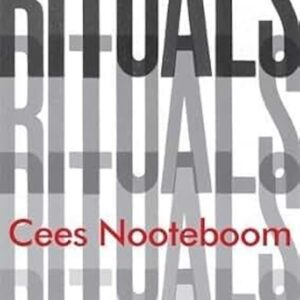A couple of months ago I re-read some of the work of an anonymous fourteenth-century figure known as the Pearl Poet or the Gawain Poet. There is little poetry in the English language that affects me so profoundly as that of the Pearl Poet. His two chief works after which he is called, Sir Gawain and the Green Knight and Pearl, form the bedrock of my understanding not just of fantasy literature, but of fiction generally, and they are a secret subterranean current in my novel Absolute Music. Why did I re-read those two long poems, and why do I value them so highly?
Every now and then, a hankering for Middle English comes over me. In Middle English you find a fruitful mixture of the mystical and visionary with the profusion of the natural world, and a great capacity to depict the forms of human life lived close to both those worlds, the physical and metaphysical. Here, for example, are my favorite lines from Gawain:
Hade he no fere bot his fole bi frythez and dounez Ne no gome bot God bi gate wyth to karp
Here is how J.R.R. Tolkien translated the verses:
He had no friend but his horse in the forests and hills no man in his march to commune with but God
I usually recommend Tolkien’s as the best translations of Gawain and Pearl. Tolkien was concerned above all to render the music of the poetry, and he did that better than anyone else who’s modernized it. He understood so-called alliterative meter better than most, and understood that this form is the heart of poetics in English. The Pearl Poet wrote, I think, the best alliterative verse of all English poets. And in Pearl he combined that tradition with the Continental poetics that would eventually give us accentual-syllabic meter. His prosody, in other words, was top shelf.
But with these my two favorite lines, there is so much richness lost in even Tolkien’s able version. “Friend” is not bad for “fere,” but really that word means companion, someone who keeps you company, goes with you, whereas “friend” is vague. And “fole” is not just a horse, but a young horse. That matters, because Gawain is a reckless young knight (this is a poem about how he is tested and matures, perhaps the greatest Christianization of chivalric romance), and it’s good to be able to hear that reflected in the seemingly accidental detail of the animal he rides. I feel “forests and hills” lack much aura in modern English and seem quite pedestrian words. A “fryth” could be a royal game preserve, but it could also be a wilderness, and for this poem’s setting in northern Wales, the latter meaning is most likely. And “hills”? Hills are pleasant, tame things. You can sing at the top of them, have a picnic. A “down” (in the modern spelling) is an elevated open place, exposed to harsh weather, among the more rugged landscapes of Britain.
Finally, though I like “no man in his march” well enough, I don’t like “commune.” Though it’s probably a good choice, because there’s no way to get the wonderful “karp” into modern English. True, it’s just like what it sounds like: carping in modern English is nitpicking, complaining, bewailing pettily (the Pearl Poet seems to have had a plucky attitude to suffering and brooked no whining). But in Middle English it can also mean gossip or chatting. It can mean sharing poems and stories and news to pass the time. It can even mean boasting and bragging. What it doesn’t mean is the woolly, self-satisfied feeling that “to commune” has taken on. How could anyone fit the paradoxical and productive clash of meanings and registers in Middle English “karp”—remember this is carping with God, i.e. praying (maybe?)—in a single modern word?
There is something incarnational about Middle English. (The wonderful poet Elizabeth Jennings made this point well.) To me, the modern language, no matter how sensuously I use it, often feels abstract, disembodied. It misses out on both the beauty of creation and transcendent truth. As William Blake said, eternity is in love with the products of time. Mundanity and mysticism, nature and meaning, earth and heaven—these and all other pairs go hand-in-hand, they depend upon and are destined for one another. But my modern language, no matter how true and precise I strive to be with it, drifts in an abstract, virtual zone and seems unable to approach either the tree outside my window or its Maker. My language seems to be a world of passing thoughts and feelings only, and those without much vitality. Middle English seems muscular, passionate, obdurate, real. It’s cold or hot on my tongue, never lukewarm so that I want to spit it out, as I so often do with contemporary language.
But all this is not quite why I re-read the Pearl Poet recently. I re-read the poetry because in Gawain and Pearl you have the two archetypal forms of fantasy—I would rather just say fiction—romance (or the quest) and the apocalypse (or vision) of higher reality. And I read this poetry because in Pearl the poet does something which my novel and so many others do, one of the hardest things to explain and justify or to live with: he used real personal loss for the sake of what must appear to be mere fiction. He made a beautiful, ecstatic poem celebrating the Christian vision of heaven and salvation (but these are just ideas, surely, just images and language games!) out of his own daughter’s death when she was two years old. He turned her into a symbol.
Is this maybe the reason people don’t like artists? What kind of a man does this with his own daughter? Or to put the question in terms of my novel, what kind of man does this with another’s daughter? For that is what I did. Absolute Music mixes fiction and reality in a way comparable to the work of Jon Fosse, Gerald Murnane and Rachel Cusk. One of my book’s real elements is one of the most central: the death of a girl when she is fourteen years old. This tragedy befell someone in my life many years ago, and it happened much as the event is depicted in the book. Why would I use the tragedy as “raw material” for a story?—a story which, like the vision of Pearl, seems to have been concocted so as to carry on a lot of fantastical landscape description and rarified theological and philosophical digression.
There is only one possible justification for the marriage that I and so many others have arranged between fiction and reality. It is very simple: There is another world. That which we see and which our reason, our “laws of thought,” can imagine or contrive, is not all that there is. And fiction—including everything real we join to it—is a portal to that other world, a transfiguration and translation, what Vladimir Solovyov called the spiritualization of matter. If it were not so, we could do no justice to the great events we witness, joyful or sorrowful.
Jonathan Geltner lives in Ann Arbor MI with his wife and two sons. His translation of Paul Claudel’s Five Great Odes is available from Angelico Press and a novel, Absolute Music, is forthcoming from Slant. If you enjoy his posts at Close Reading, check out his new Substack, Romance and Apocalypse, for more frequent and in-depth essays on the places where literature and other arts meet religious ideas and experience.





